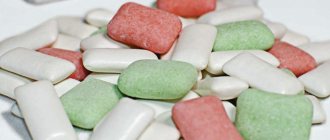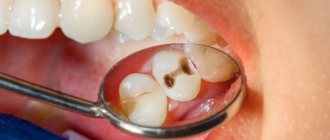- How to assess the freshness of your breath?
- Why can't bad breath be ignored?
- Causes of bad breath
- How to get rid of bad breath on your own?
- Professional help for halitosis
| The general impression of the interlocutor is formed under the influence of many factors, a significant part of which concerns his appearance and... aroma. A wide variety of perfumes is not always able to hide natural aromas. Moreover, artificial odors that are too strong and intrusive can be perceived negatively by others. |
At the same time, an unpleasant natural odor is assessed much more negatively. You often have to deal with bad breath , and the cause of its occurrence can be completely different. Whatever the cause of the problem, it requires a solution, since otherwise harm can be caused not only to social connections, but also to physical health.
Halitosis
Doctors use the term halitosis to define severe bad breath. The amount of pathogenic microflora in the oral cavity increases, which is why an unpleasant odor appears. It may smell like garlic, hydrogen sulfide, ammonia, or putrefaction, depending on the type of bacteria.
This symptom can be observed in both adults and children, both in humans and in mammals. Halitosis can indicate liver disease, pathologies of the digestive tract, intestines, ENT diseases, dental problems, diseases of the throat and upper respiratory tract.
The causes and treatment of halitosis may be under the jurisdiction of physicians of different specialties. If ordinary hygiene measures do not help, such as thorough brushing of teeth and tongue, treatment of infectious diseases of the larynx and respiratory system, then you should be examined to identify the causes of the unpleasant symptom.
Bad breath in itself is not a disease, but it does indicate the presence of problems. Most often they relate to the pathological condition of the mucous membranes of the mouth, teeth, and gums. But if halitosis is accompanied by a number of other symptoms, then the stomach, liver, and intestines should be examined.
What smell may indicate hepatitis C?
Halitosis is bad breath that is not relieved by brushing and rinsing. May be considered a sign of serious internal organ disorders. Often appears in chronic hepatitis, which is accompanied by the proliferation of connective tissue in the liver (fibrosis).
The body is constantly under the influence of toxins due to impaired detoxification function of the liver.
Toxic substances cannot be completely neutralized, which leads to the appearance of an odor. It may differ depending on the severity of the gland damage:
- Hepatic - for acute liver failure and cirrhosis.
- Ammonia smell - in case of kidney failure;
- The smell of raw meat (dead mouse) - with endogenous coma due to acute hepatitis C. Accompanied by bloody vomiting, fever, tachycardia.
- Sulfur or rotten fruit is a sign of exogenous coma, which is caused by cirrhosis of the liver and high pressure in the portal vein.
- The sweet smell is caused by poisoning after eating food, medications, or organic compounds.
- Slightly rotten, cloying occurs with excess bilirubin. In this case, the skin may also smell. Urine and feces change color.
- A pungent, bitter odor is caused by stagnation of bile or a malfunction of the bile ducts. There is also a bitter taste in the mouth, and the tongue becomes yellow-brown in color.
The main reasons that cause the appearance of liver odor from the mouth:
- Toxic effects on the body of chemicals (through the skin, respiratory tract or digestive tract).
- The use of drugs that have a hepatotoxic effect. In severe cases, there is a risk of drug-induced hepatitis.
- Serious consequences of liver diseases: oncology, cirrhosis, cholelithiasis.
- Impaired blood microcirculation due to exacerbation of pathologies of the gallbladder, as well as its ducts.
- Recovery period after antiviral therapy for hepatitis C.
- If donor blood of the wrong type was transfused.
- Liver failure.
In addition, the oral cavity begins to smell when smoking, alcohol abuse, or strict diets, which causes disturbances in the liver.
Features of the disease
If your breath smells unpleasant and strong, this may indicate that there are problems with the liver. It is necessary to examine this organ, as well as the stomach, if the smell is intense and constant, does not depend on the frequency of meals and its quality. The following manifestations are also observed in liver disease:
- changes in the color of the skin, mucous membranes and eye sclera, the skin becomes yellowish due to stagnation of bile,
- a putrid or garlicky smell comes not only from the mouth, but also from the skin,
- the color of the tongue changes, a coating appears on it,
- skin rashes appear that cause serious discomfort,
- dilation of veins, appearance of spider veins on the abdomen,
- dyspeptic symptoms: nausea, flatulence, periodic bowel movements,
- feeling of a bitter taste in the mouth,
- fatigue with little exertion, excessive drowsiness,
- pain in the right side of the abdomen.
If all these signs are observed, then it is necessary to urgently consult a doctor , since this combination indicates a serious illness characterized by insufficient functioning of the liver.
Causes of bad breath
The obvious cause of bad breath is dental plaque. However, it is believed that this is eliminated during the morning and evening brushing of teeth, so what then produces this smell? There are plenty of answers:
- still the same plaque - from childhood we were taught to brush our teeth in the morning and evening, and to do the procedure diligently, but even the most careful use of a toothbrush is often not exhaustive; the point is that bacteria accumulate in places where even the most innovative brushes cannot reach; the problem is solved simply, with the help of dental floss and mouthwash, the use of which allows you to penetrate into the most secluded places and this is a completely different technology from “brush” technologies; It is also important to remember that the source of plaque is not only the teeth, but also the surface of the tongue, which also needs cleaning;
- consumption of “fragrant” products - some of them require cleaning the mouth and thereby eliminating their traces, while others provoke a more persistent odor, sometimes manifesting itself even some time after consumption; onions and garlic - contain volatile sulfur compounds, which the body gets rid of both through the pores of the skin and through the mouth;
- dairy products, cottage cheese, cheese - the high protein content makes traces of these products in the mouth a favorable environment for the proliferation of anaerobes; the very destruction of protein and the breakdown of lactose contained in milk forms amino acids and sulfur compounds;
- fish and meat are a source of the same animal protein, the breakdown pattern of which repeats the above;
- coffee - its composition disrupts the normal alkaline environment for the oral cavity, turning it into an acidic one, which is already a haven for pathogenic microorganisms; a metallic sour taste in the mouth after drinking coffee indicates exactly this;
- sweets - the high sugar content in them is favorably perceived by pathogenic microflora, which hastens to multiply in the remains of sweets on the teeth;
- alcohol - provokes dry mouth, which promotes the growth of bacteria;
- tobacco - smoking has an extremely negative effect on the oral cavity, it reduces local immunity, and supplies fetid particles, and promotes the proliferation of pathogenic microflora, and destroys the health of any organ, which sooner or later turns into a disease of the oral cavity and internal organs;
- complications of caries - pulpitis and periodontitis;
- sinusitis;
Diagnostics
In order to determine the cause of halitosis, it is necessary to conduct a number of studies. The liver, stomach, and intestines are examined. The doctor examines the patient, assesses the condition and color of the skin, mucous membranes, and tongue.
A general blood test is required . In case of liver cirrhosis, liver failure and other severe pathologies, the blood changes characteristics, since its composition depends on the quality of purification. If the liver is not functioning sufficiently, this is immediately revealed by the state of the blood.
A stool examination may also be performed , since halitosis may indicate that the stomach or intestines are diseased. Incompletely digested food indicates insufficient functioning of the gastrointestinal tract, and sometimes the liver.
To make an accurate diagnosis, instrumental studies are also carried out. The stomach and gastrointestinal tract organs are examined using fibrogastroduodenoscopy. An ultrasound scan of the liver, pancreas, and gall bladder is performed. In severe cases, histological studies of tissues of the affected organ obtained by biopsy are necessary.
Condition of mucous membranes
If the liver does not function sufficiently, then additional stress is placed on the skin. The skin is able to filter and remove toxins, and when the liver does not cope with its task, this is sure to affect the condition of the skin and mucous membranes.
A yellowish or excessively pale skin color may indicate liver disease. Yellowness is observed in hepatitis and gallbladder diseases, and indicates a high level of bilirubin. White skin color, especially noticeable on the fingertips and face, can also indicate a diseased liver.
In liver pathologies, the mucous membranes and eye sclera also change color. Swelling of the skin and mucous membranes may occur. The skin becomes dry, pustules and pimples appear on them.
How to get rid of bad breath on your own?
If bad breath is detected, but at first glance it is clear that it is not caused by a health problem, then it is advisable to take home, independent methods to eliminate it. If bad breath is simply a sign of staleness, that is, bacteria growing excessively for any reason, the following tips are recommended.
Maintain oral hygiene
Maintaining oral hygiene is more than just brushing your toothbrush twice a day. The latter is just the bare minimum. Daily plaque removal should be done with toothbrushes, followed by dental floss and mouthwash. The latter involves eliminating bacteria from the most difficult to reach places, such as interdental areas, as well as superficial rinsing and disinfection of areas that do not appear dirty to the naked eye.
An anaerobic, that is, “oxygen-free” environment is comfortable for bacteria. This is ideally recreated on a coated tongue, the surface of which many do not consider it necessary to clean daily. Usually, carrying out such a procedure on a regular basis eliminates the problem of unpleasant odor. To clean your tongue, you can use either a teaspoon or the back of a toothbrush specially adapted for this purpose. In addition, there are special devices for cleaning the tongue - these are single or double scrapers with a flat working part, the shape of which is maximally adapted to the anatomical shape of the tongue.
Once every six months, professional teeth cleaning is recommended to remove plaque that somehow accumulates there, for example, on their internal surfaces. In this way, tartar as a concentration of bacteria is prevented.
Maintain a normal oral environment
It is important, firstly, to maintain thorough oral hygiene, and secondly, to regularly visit a gynecologist as part of preventive measures. Once every six months, a specialist must examine the condition of the teeth and oral cavity, and when identifying the initial stages of diseases, stop them, thereby preventing the pathological growth of dangerous microflora.
The topic of smoking deserves special attention. A smoker cannot be surprised by the unpleasant odor from his mouth, because its nature is absolutely clear. However, you can reduce this odor to a minimum, for example, by using chewing gum, rinses and mouth fresheners, but certainly with an antibacterial function and the function of restoring the acid-base balance. Naturally, smokers must observe no less thorough hygienic procedures for cleaning the oral cavity and regularly visit the dentist, since the bad habit affects the health of the teeth, and the need for professional teeth cleaning becomes more acute. Of course, the best solution is to quit smoking.
Maintaining cleanliness in the oral cavity is complicated by the presence of dentures or corrective systems. How to clean your teeth in this regard, and what additional products are needed for an improved procedure, will be told by a doctor who deals with the health of your oral cavity. Removable structures require appropriate storage, often in a container with disinfectant liquid.
Monitor your diet
Active consumption of protein foods creates a favorable environment in the mouth for anaerobic bacteria. Adherents of vegetarianism are less likely to experience bad breath, but everyone else can be advised to dilute their diet as intensively as possible with fruit and vegetable components, and after consuming animal proteins, restore the acid-base balance through hygiene procedures.
Along with products that provoke an unpleasant odor, a list of products has been created that freshen breath and stimulate saliva production:
- plain water - it literally washes microbes into the digestive tract, where under the influence of enzymes and beneficial lactobacilli they are destroyed; in addition, water moisturizes the oral cavity, and its lack in the body results in dry skin and mucous membranes;
- green tea - the content of catechin makes the product a powerful antioxidant and destroyer of pathogenic microflora; may be a healthy alternative to coffee;
- chewing gum without sugar - stimulates the production of saliva and masks the unpleasant odor, restores the acid-base balance;
- parsley - like other greens, helps get rid of unpleasant aromas and refreshes; it should be added to all possible dishes, and you can also simply chew it to freshen your breath;
- carrots, celery, cucumber - as well as other fresh crunchy vegetables clean plaque from teeth and stimulate salivation;
- apples and pears - their effect is similar to the previous one, but at the same time they have a bactericidal effect;
- citrus fruits or summer berries are a source of vitamin C, necessary for the normal balance of oral microflora, as well as for the prevention of periodontal diseases;
- nuts - the abundance of fiber has a cleansing function, a kind of scrub for the oral cavity;
- yogurt - but only natural, contains a sufficient amount of necessary lacto- and bifidobacteria, thereby creating normal microflora both in the mouth and subsequently in the intestines.
Mouth rinse
As part of the fight against unpleasant odor, a popular home remedy is rinsing, prepared according to folk recipes and eliminating pathogenic microflora. Their effect is to disinfect the oral cavity, have a bactericidal and anti-inflammatory effect, and refresh. Rinses are prepared based on:
- propolis,
- daisies,
- echinacea,
- St. John's wort,
- oak bark,
- tansy with wormwood,
- tansy with yarrow,
- alfalfa,
- dill or its seeds,
- essential oils - mint, menthol, eucalyptus, tea tree, cloves, sage, grapefruit seeds.
If the application of these recommendations in a very short time does not help to improve the condition or completely eliminate the problem, then it is advisable to contact a specialist for specialized advice. Postponing a decision is fraught with an aggressive and unfavorable effect of pathogenic microflora on the body and aggravation of diseases if they form the nature of bad breath.
Treatment
Treatment of liver diseases is carried out by a hepatologist. Not all medical institutions have such specialists, so if there is no hepatologist, you can contact a gastroenterologist.
Treatment is prescribed based on the diagnostic results. The medications used, regimens and dosages depend on the diagnosis, stage and severity of the disease, the presence of concomitant diseases, and the age of the patient.
If liver inflammation of an infectious etiology is diagnosed, then therapy is carried out using antibacterial or antiviral agents against a specific pathogen. Broad-spectrum antibiotics may also be prescribed.
To restore hepatocyte function, drugs containing essential phospholipids are used . To support and cleanse the body of toxins in case of insufficient liver function, courses of vitamins and lipoic acid are prescribed.
In severe cases, drug therapy may not be effective enough. In case of advanced diseases, the presence of malignant formations in the parenchyma of an organ, doctors are forced to undertake surgical treatment methods.
Menu adjustments
When liver pathologies are detected, treatment is necessarily accompanied by the prescription of a special diet. The frequency of food intake, the method of processing it, and the temperature matter.
You need to eat food in small portions at fairly short intervals. Food should not be too cold or hot. You should not eat fried, canned, smoked, overly salted or spicy foods.
These measures help not to overload the liver, distributing the load evenly. You should also avoid eating fatty foods, confectionery, marinades, and sausages. No seasonings are used during cooking; salt is added in minimal quantities. Food is steamed, boiled or baked.
You should stop eating bread. You can eat biscuits or toasted baguette.
If you have liver disease, it is strictly forbidden to drink alcohol, since the diseased organ is simply not able to process it. You can’t drink sweet soda; you need to minimize the consumption of coffee and strong tea. You should drink only natural, non-concentrated juices.
It is useful to eat honey, nuts, dried fruits. Fermented milk products should be consumed with caution, little by little. Whole milk is excluded. Animal fats must be replaced with vegetable fats. Moderate but obligatory consumption of vegetable oils is beneficial for a diseased liver.
Additional measures
If the liver pathology progresses, then it is quite difficult to remove the liver odor. First of all, it is necessary to eliminate the root cause, and not deal with the consequences. While the underlying disease is being treated, you can take some measures so as not to feel uncomfortable while being around people.
Rinsing helps get rid of odor. After each meal, rinse your mouth with water or mouthwash. Disinfecting solutions help to cope with odor by reducing the number of pathogenic microorganisms found on the mucous membranes of the oral cavity. A weak solution of potassium permanganate has a good bactericidal effect.
To irrigate the oral cavity, you can use decoctions of medicinal plants. You need to choose herbs that have a disinfectant effect. These include: chamomile, lemon balm, St. John's wort, oak bark, scrofula, eucalyptus.
Halitosis in combination with other signs may indicate severe liver pathologies, so if you are plagued by constant bad breath, you should be examined by a doctor.
How to assess the freshness of your breath?
Bad breath is not acceptable for a successful and prosperous person, but we encounter it very often. Why? Is it really because someone considers it acceptable for themselves? No, the fact is that our body has an amazing ability to adapt to many circumstances, and to the unpleasant odor emanating from it as well. It is noteworthy that some people notice bad breath, for example, after certain foods, while others, being heavy smokers, are not aware of the aftertaste. The peculiarity is that the more often a smell accompanies a person, the sooner he will get used to it. How can you determine if there are unpleasant notes in your breath? There are several methods available:
- advice from a friend - contact a loved one with a specific question; be that as it may, from the outside the susceptibility to odors is more acute;
- use a teaspoon - run its outer side over your tongue, a small amount of plaque and saliva remaining on it will be the source of your smell, evaluate it;
- use dental floss - pass the floss in the spaces between the teeth, the remaining plaque and saliva on it emit the same smell that your interlocutors smell;
- lick your own hand - you need to use the entire surface of the tongue; saliva, slightly dried on the hand, will emit a slightly weaker odor than that coming from the mouth, since the end of the tongue, which is also involved in the test, contains a natural antibacterial component;
- use a halimeter, a pocket device for measuring the concentration of hydrogen sulfide in exhaled air and rating it on a 4-point scale;
- consultation with a specialist - ultra-sensitive equipment is used to accurately determine the degree of bad breath, followed by a discussion of the problem with a doctor.
Identifying a problem usually takes a little time, and creates a need to solve it rather than ignore it.









